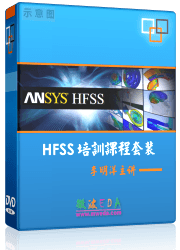- 易迪拓培训,专注于微波、射频、天线设计工程师的培养
HFSS15: Setting Adaptive Analysis Parameters for HFSS
When you set up an adaptive analysis, define the following parameters under the General tab of the Solution Setup dialog box:
• Enter the Solution Frequency and select the frequency units from the pull down list.
• Optionally, select Solve Ports Only.
• Maximum Number of Passes
• Maximum Delta S or Use Matrix convergence (for designs with ports). Here you can set matrix values for convergence, including maximum delta for Mag S and Phase S.
• Maximum Delta Energy for convergence per pass (for designs with voltage sources, current sources, incident waves, or magnetic bias).
• For Eigenmode solutions, specify Maximum Delta Frequency Per Pass and, if desired, Converge on Real Frequency Only.
Under the Options tab of the Solution Setup dialog box, you can edit the following settings:
• Lambda Refinement
• Maximum Refinement Per Pass
• Maximum Refinement
• Minimum Number of Passes
• Minimum Number of Converged Passes
• Order of Basis functions
• Enable Iterative Solver and associated Relative Residual Setting
• Enable Use of Solver Domains
Under the Advanced tab of the Solution Setup, depending on the solution type, you can edit the following settings.
• Initial Mesh Options for mesh linking
• Port options (Maximum Delta Zo, whether to Use Radiation Boundary on Ports and Min/Max Port Triangle settings)
• Linked Solve options, including no Link.
• Whether to Save fields, and/or whether to save radiated fields only. To view a port field display, you must save fields. Save fields options also occur for Discrete and Fast Sweeps.
Under the Expression Cache tab of the Solution Setup, you can create and manage expressions to use for adaptive convergence.
Under the Derivatives tab of the Solution Setup, you can:
• Specify which variables to use for calculating derivatives.
HFSS 学习培训课程套装,专家讲解,视频教学,帮助您全面系统地学习掌握HFSS
上一篇:Sensitivity Analysis Overview
下一篇:Setting Field Plot Defaults


